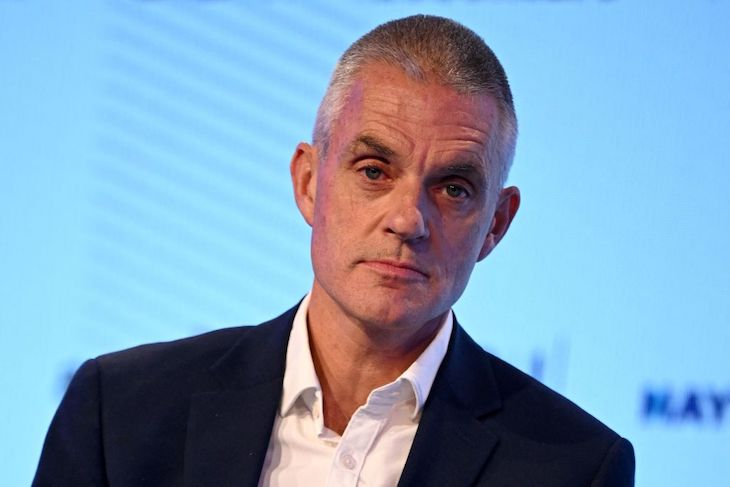Has anyone ever come up with a better put-down for Nick Robinson? It is even better that it came from his own boss. Interviewed on the Today programme yesterday morning, BBC director-general Tim Davie said ‘we often refer to people like yourself as ‘talent’, but I’ve kind of banned that.’ From now on, he intimated, Robinson and his colleagues would be known as mere ‘presenters’.
The heavies will still be clamping down on those who fail to pay the licence fee
Davie also went on to speak about ‘bad actors’, although it turned out he wasn’t talking about the cast of EastEnders – he meant propagandists in Russia, whose activities the BBC is out to challenge.
But that aside, does anyone care whether presenters are known as on-air ‘talent’? What many of us do care about rather more is being stung for a TV licence supposedly to fund public service broadcasting, only to find our money splashed on extravagant salaries to tempt presenters, or keep them away, from commercial broadcasters. If the BBC is engaged in a bidding war to compete with commercial TV stations, then by definition what it is doing is not public service broadcasting – it is just state-owned TV. Gary Lineker (on £1.35 million a year) and Zoe Ball (£950,000) are effectively among the highest-paid public sector workers.
Davie was on the Today programme because last week the BBC announced that it has commissioned an independent report into its workplace culture. This review was launched after Huw Edwards was revealed still to be receiving his £475,000 salary for several months between being arrested on suspicion of making indecent images of children last November, for which he pleaded guilty in July.
Davie is still unable to say when, or if, the BBC will be able to claw back the £200,000 paid out during that time. Edwards had already been removed from his presenter’s chair several months before his arrest. He took time off sick following claims – which Edwards has never commented on – that he paid a young man to send sexually explicit pictures of himself. The police on that occasion deemed that no criminal offence had been committed, although that didn’t mean the BBC had to keep him on its payroll.
Sorry, but for the director-general to pop up on the radio and announce that he has ditched the word ‘talent’ from being used as shorthand for presenters comes across as a bit of window-dressing. It gives the impression that Davie is doing something to challenge the BBC’s swollen payroll and its failure to deal with or even notice the scandals going on in its midst. But does he really intend to change anything? Sadly, I suspect not.
When the BBC’s next annual report is published it will still reveal that it is paying hundreds of thousands of pounds a year to presenters to front the kind of shows which we can watch on commercial stations elsewhere. Meanwhile, the heavies will still be clamping down on people, quite often women from low-income households, for failing to pay the licence fee. We will still be gritting our teeth at BBC bias, over Hamas, Brexit, climate change and many other things. It is just that we will no longer be expected to pretend that its presenters are talented.








Comments